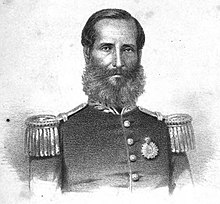Alexandre Gomes de Argolo Ferrão Filho, Viscount of Itaparica
The Viscount of Itaparica | |
|---|---|
 | |
| Birth name | Alexandre Gomes de Argolo Ferrão Filho |
| Born | August 8, 1821 Salvador, Bahia, Brazil |
| Died | June 23, 1870 (aged 48) Bahia, Brazil |
| Allegiance | |
| Branch | |
| Years of service | 1837–1870 |
| Rank | |
| Battles / wars | |
Alexandre Gomes de Argolo Ferrão Filho was a Brazilian Marshal of the Balaiada and the Paraguayan War. He commanded the 1st Division of the Imperial Brazilian Army and primarily participated in the Battle of Tuyutí and the Battle of Ytororó. He was one of the main figures behind the Pikysyry maneuver and is often credited for the maneuver along with the Duke of Caxias but he would die months later after the war's conclusion from his injuries during service.
Origins
Alexandre was born out of wedlock as the son of Alexandre Gomes de Argolo Ferrão on August 8, 1821.[1] Argolo is of Spanish descent as his descendants can trace their origins to the initial colonization of Brazil under Tomé de Sousa and they had historically settled in Salvador, Bahia.[2]
Military career
He entered military service on December 2, 1837, as a cadet within the 1st Artillery Battalion[1][3] and was promoted to Second Lieutenant by the next year. His first active military service was during the repression of the Balaiada in 1840. After this, he was promoted to captain in 1844 and awarded the Order of the Rose as a Knight in 1847. He was also awarded the Knight of the Order of Aviz in 1849 and promoted to Major in 1852. He was then given command of the Bahia National Guard from 1854 to 1855 and was promoted to Lieutenant Colonel in 1859.[4]
When the Paraguayan War broke out, he was given command of the 2nd Army Corps under the order of the Duke of Caxias. During his service in the war, the Duke of Caxias ordered the Argolo Ferrão Battalion to construct the Grão-Chaco Road which would improve Brazilian navigation within the Gran Chaco. When asked about the probability of such a task, Argolo responded with: "Marshal! If it's possible, it's done! If it's impossible, we'll do it!"[2] Around this time, he participated in the Battle of Tuyutí[5] and the Battle of Ytororó where he would be wounded in the latter. Antônio Loureiro de Souza, referring to the Viscount's bravery, stated:
The great Caxias with whom he served, held him in high regard, never getting tired of praising him on various orders of the day. Thus, he knew how to be a great patriot, one of those who, through fearlessness and patriotism, were inscribed in national history.
In 1869, he left Paraguay and on June 23, 1870, he died as a result of the wound he suffered during the Battle of Ytororó.[2][4] At the time of his death, Argolo had reached the rank of Marshal.[1] Currently, in the city of Barreiras, Bahia, the 19th Hunters Battalion named after him.[6]
References
- ^ a b c "094 – Marechal de Campo Alexandre Gomes de Argolo Ferrão Filho" (PDF). dspace.stm.jus (in Brazilian Portuguese). Retrieved February 13, 2023.
- ^ a b c "As estradas da família". Diário do Sudoeste (in Brazilian Portuguese). August 6, 2021. Retrieved February 13, 2023.
- ^ Da Fonseca Issa, Francisco Luiz (January 4, 2019). Medalhas E Condecorações Da Segurança Pública Da Bahia (in Portuguese). Salvador, BA. p. 148. Retrieved February 13, 2023.
{{cite book}}: CS1 maint: location missing publisher (link) - ^ a b "Argollo Uma família brasileira de 1500". Manuel Abranches de Soveral (in Portuguese). Archived from the original on February 22, 2011.
- ^ Esposito, Gabriele (October 31, 2019). The Paraguayan War 1864–70: The Triple Alliance at Stake in La Plata. Bloomsbury Publishing. pp. 55–57. ISBN 9781472834416. Retrieved October 13, 2022.
- ^ "19º Batalhão de Caçadores - Batalhão Pirajá - Página inicial". 19º Batalhão de Caçadores (in Brazilian Portuguese). Retrieved February 13, 2023.
